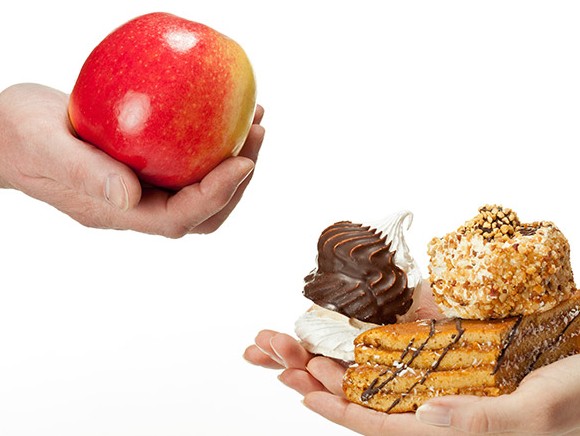
Food producers in the Netherlands need to make their products less salty, sweet and greasy. A lot less, in order to make Dutch people healthier. And that ‘need’ is not determined by law, but by themselves. The producers have agreed on this in an umbrella agreement. What is the state of affairs? What still needs to happen? An interview with Ronald Visschers.
Ronald Visschers, director at Top Institute Food & Nutrition (TiFN) since August 2017, is part of the Product Improvement Criteria Committee. This Committee advises the Minister on how to set up a new, integral system for product improvement. The reason for that is that, now that the ‘Tick’ symbol may no longer be put on packaging, there is no more incentive for producers to become ‘best in class’. Visschers is also chairman of the independent Scientific Advisory Committee for Product Improvement (WAC). The WAC tests the agreements from the ‘Product Composition Improvement Agreement’ concluded in 2014 in terms of ambition level and relevance, and advises the parties that have signed the agreement (the Ministry of Health, Welfare and Sports, Central Bureau for Food Trade, the Dutch Food Industry Federation, the Royal Dutch Catering and Dutch Catering Association).
The ambitions are great. During last year’s Food Summit, it was stated that the Netherlands should be at the forefront of safe, healthy and sustainable food and sustainable agriculture and horticulture in 5 to 10 years. Reducing the levels of salt, saturated fat and calories (sugar and fat) in products is one of the goals to help achieve that ambition.
“Some industries are doing very well, while others have not achieved much yet. In order to achieve the goals in 2020, the ambition needs to be further increased. The agreements made are steps in the right direction, but there is still too much sugar and salt in food. What surprises me is that everyone agrees: there is a problem; our food is too salty, we are getting too fat. We know that healthy food is important to public health. So let’s all get to work on that!”
“It would help if the umbrella organisations took more joint initiatives. A great example of a good initiative is the pilot project of FNLI, which was recently completed. Through the FNLI, producers were able to utilise experts that would support them internally with their reformulation. The expert would visit them for an intake and provide advice for product improvement based on their findings. After three months, there would be an evaluation. The project was received well, both by the knowledge institutes that provided the experts and by the producers. I am curious to see if there will be a follow-up to this. That would be a good thing.”
“That they do not have enough in-house knowledge. Reformulating is often a technical problem, especially when it concerns larger steps. Major companies have an advantage in this, as they have large R&D departments and patented technologies. For smaller companies, it is hard to keep up. Moreover, the knowledge they have is fragmented. Solving technological issues works well when you are either very large, or if you work together. Unfortunately, collaborations are still too uncommon.
What also strikes me is that the work plans are concise and do not describe where bottlenecks are expected. It is often indicated how long a process will take, but it remains unclear what is going to happen within that period and what technical steps they are going to take. If the plans are better elaborated, we can do more with them as a committee. And, more importantly, there will be a better chance of success!”
“Involve experts in the reformulation of your products; do this from the start of the project proposal. Even if it does not run via a pilot project. The experts have knowledge and experience. Moreover, as an independent outsider, they view processes with a fresh look; they see things that you have become blind to as a producer. Knowledge institutions can help manufacturers with product improvement, but unfortunately, producers are particularly concerned with the costs.”
“Over the past year, we have focused on the question of how an integral system of product improvement can be set up to replace the ‘Tick’. After all, after 19 October, packages with the Tick may no longer be produced. Companies consider the independent scientific criteria of the Tick an important incentive for innovation. As such, the incentive to become ‘best in class’ is now gone. We need to have a similar system if we want to achieve the previously mentioned ambitions.
“Let’s all get to work on this!”
We have researched whether the criteria of the Tick can be linked to the maximum standards for salt, saturated fat and sugar. This concerns the standards that are agreed within the Product Improvement Agreement regarding a large number of product categories. There are also criteria for nutrients for products in the Food Pyramid. We have mapped the relationship between the criteria of the Tick, the Agreement and the Food Pyramid and identified the opportunities for an integral system.”
“This is proving to be very difficult. This is not currently possible, as there is too little connection between the systems. I found it surprising that there were such large differences between the criteria that WECOM had for the Tick, the criteria for the Food Pyramid and the ambitions from the Product Improvement Agreement. We need to harmonise that much more. At the same time, we know that such a system has a limited impact. There is still a holy belief in the idea: ‘if we just put enough knowledge into the people, they will start making sensible decisions automatically’. That is not the case. There is no undisputed confidence in the authority of knowledge carriers such as the doctor or scientist anymore. Therefore, it remains important to use a mix of instruments to seduce consumers into making healthier food choices. Improving the product composition is just one of those. To make people healthier, we need a much broader social approach, involving citizens and social organisations in more and more aspects.”
“We did look at that as well. The approaches differ greatly per country. Moreover, culture plays a large role in whether a measure works or not. We do know that a set of criteria for product improvement alone is not enough. It is about combining multiple factors. Important pillars for this are a strong government control, good collaboration with the industry and social organisations, and ambitious but feasible criteria per product group, which are also made stricter in the process. We can already see that the industry imposes more stringent standards on itself than the government does. They are far more ambitious than in the criteria that were formulated in the Tick. Take vegetable preserves; that industry has made huge strides in salt and sugar reduction.”
“I love the overlap of research, science, applicability and scientific excellence, especially when it comes to the relationship between ingredients and the effect on health. At least half of the projects at TiFN fit into this theme. Consumer research also fascinates me. At the World Food Centre in Ede, we are going to try to find answers to the question of what is still effective at having people make healthy choices in a modern context.”
“What I am also very excited about is that we recently founded the ‘Sustainable Food Initiative’ (SFI: www.sustainablefoodinitiative.eu). This initiative originated from the business world. We bundle knowledge and results of academic research with innovations and technological innovation in the business world. We do this in collaboration with various parties, large companies like Unilever and Kraft-Heinz, but also Wageningen Campus, other universities, students, start-ups and cooperatives like AVEBE and Cosun. An open mind-set and creative learning form the basis for our approach. We face many challenges: clean label, Internet of food, Regenerative Farming, protein transition, you name it. We offer a lot of space for trying out completely new possibilities and techniques.”

“Yes! There is a need for more control with less administration at all levels. Every province has its own Food knowledge campus. The research and its applications become very fragmented as a result. With SFI, we have the ambition of bringing together a number of areas at a national level, including in protein transition and sustainable food production. We apply a ‘founding fathers principle’, but everyone who wants to can join the projects.
Source: © Maryna Pleshkun/Shutterstock.com